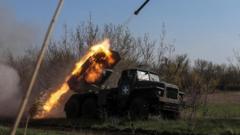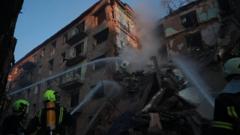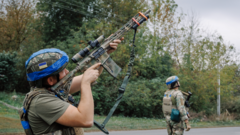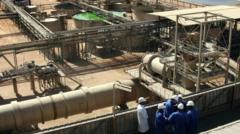In a significant show of solidarity, Ukraine's allies have pledged €21 billion in new military aid, with Germany at the forefront of this commitment, signaling a decisive stance in the ongoing war.
Allied Nations Commit €21bn in Military Assistance to Ukraine

Allied Nations Commit €21bn in Military Assistance to Ukraine
European allies unite to bolster military support in aid of Ukraine amid ongoing conflict concerns.
European defence ministers have collectively pledged €21 billion ($24 billion; £18 billion) in fresh military aid intended for Ukraine, amidst what they have termed "a critical year" for the country amid ongoing hostilities. Over half of this financial support, amounting to €11 billion, is set to flow from Germany, underscoring its pivotal role in the coalition’s efforts. British Defence Minister John Healey emphasized that these pledges would convey a decisive message to Moscow about the unity and resolve of Ukraine's allies.
The announcement emerged during a meeting of the Ukraine Defence Contact Group (UDCG) at NATO’s headquarters in Brussels, where discussions focused on a range of military supplies, including air defenses, missiles, and advanced drone technologies. The pledges are seen as vital due to perceived shifts in U.S. priorities under former President Donald Trump, which have led to greater reliance on European nations for sustaining military support for Ukraine.
Britain’s contribution includes a substantial £450 million ($590 million) specifically allocated for radar systems, anti-tank mines, and other equipment vital for Ukraine’s defence. This is part of a broader commitment of £4.5 billion made by the UK earlier in the year.
At the forefront of the alliance's military focus is air defense capability. Healey reported that Russian forces had deployed an increased volume of glide bombs and drones, emphasizing the critical nature of drone warfare, which he stated was responsible for 70% to 80% of battlefield casualties.
Germany is gearing its support toward artillery, intending to send 100,000 rounds of ammunition, military vehicles, and a series of advanced air defense systems including four IRIS-T systems equipped with 300 missiles. German Defence Minister Boris Pistorius remarked that “only with a strong military can negotiations lead to a just and lasting peace.”
The 27th UDCG meeting welcomed participation from defence ministers of 50 nations, signifying a broad international commitment. U.S. Defence Secretary Pete Hegseth joined remotely, reflecting ongoing U.S. support, as noted by Ukrainian Defence Minister Rustem Umerov.
Despite the collaborative efforts for military aid, Healey and Pistorius separately criticized Russia for stalling on potential peace negotiations. Healey pointed out that the Kremlin had blocked a U.S.-backed peace proposal for over a month. Meanwhile, talks continued, with U.S. special envoy Steve Witkoff meeting President Vladimir Putin to discuss the ongoing conflict, although expectations for significant progress remain low.
In operational updates, the Russian military reported recent advances, claiming control of the village of Zhuravka in Ukraine’s northern Sumy region, though Ukrainian officials have yet to verify this claim. Ukrainian President Volodymyr Zelensky affirmed the presence of a significant number of Russian troops poised near the border, indicating ongoing tensions in the region.
The developments reflect the complexities of international military alliances and underscore the urgent need for comprehensive support for Ukraine amidst a protracted conflict.





















